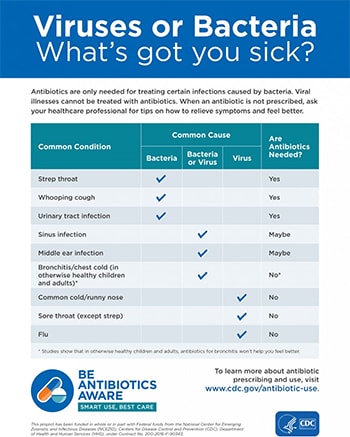"Be Antibiotics Aware is the Centers for Disease Control and Prevention’s (CDC) national educational effort to help improve antibiotic prescribing and use and combat antibiotic resistance.
Antibiotic resistance is one of the most urgent threats to the public’s health. Antibiotic resistance happens when germs, like bacteria and fungi, develop the ability to defeat the drugs designed to kill them. That means the germs are not killed and continue to grow. More than 2.8 million antibiotic-resistant infections occur in the United States each year, and more than 35,000 people die as a result.
Antibiotics can save lives, but any time antibiotics are used, they can cause side effects and contribute to the development of antibiotic resistance. Each year, approximately 28% of antibiotics are prescribed unnecessarily in doctors’ offices and emergency rooms (ERs), which makes improving antibiotic prescribing and use a national priority.
Helping healthcare professionals improve the way they prescribe antibiotics, and improving the way we take antibiotics, helps keep us healthy now, helps fight antibiotic resistance, and ensures that these life-saving drugs will be available for future generations.
When Antibiotics Are Needed
Antibiotics are only needed for treating certain infections caused by bacteria. We rely on antibiotics to treat serious, life-threatening conditions such as pneumonia and sepsis, the body’s extreme response to an infection. Effective antibiotics are also needed for people who are at high risk for developing infections. Some of those at high risk for infections include patients undergoing surgery, patients with end-stage kidney disease, or patients receiving cancer therapy (chemotherapy).
When Antibiotics Aren’t Needed
Antibiotics do not work on viruses, such as those that cause colds, flu, bronchitis, or runny noses, even if the mucus is thick, yellow, or green.
Antibiotics are only needed for treating certain infections caused by bacteria, but even some bacterial infections get better without antibiotics. Antibiotics aren’t needed for many sinus infections and some ear infections. Antibiotics can save lives, and when a patient needs antibiotics, the benefits usually outweigh the risks of side effects and antibiotic resistance. When antibiotics aren’t needed, they won’t help you, and the side effects could still cause harm. Common side effects of antibiotics can include:
- rash
- dizziness
- nausea
- diarrhea
- yeast infections
More serious side effects include Clostridioides difficile infection (also called C. difficile or C. diff), which causes severe diarrhea that can lead to severe colon damage and death. People can also have severe and life-threatening allergic reactions, such as wheezing, hives, shortness of breath, and anaphylaxis (which also includes feeling like your throat is closing or choking, or your voice is changing).."
Antibiotics


No comments:
Post a Comment